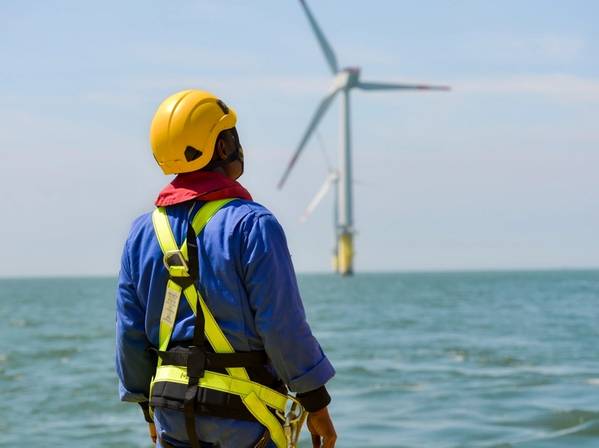
As it continues to grow its track record of contributions to Scotland’s renewables mission, the offshore wind sector is currently making all the right headlines.
Amid the positive news, however, anyone with knowledge of sustainable business success will tell you it presents a potential problem in the form of the ever-growing demand for another resource – suitably skilled workers.
According to a recent report, the demand for offshore wind personnel could triple in Europe, rising from around 110,000 to around 350,000 in 2030. It’s anticipated the growth will be particularly evident in the next four years.
The projected rise brings one very specific issue for businesses – the end of the UK offshore wind worker concession on July 1 this year – into sharp focus. Having been first introduced in 2017, there is no indication the concession will be extended further.
Put simply, the purpose of the concession is to enable foreign nationals (who now include both EU and non-EU nationals) to join and work on vessels engaged in the construction and maintenance of offshore wind projects within UK territorial waters (UKTW), which is the 12-mile zone that determines if a worker is subject to UK immigration laws from a right to work perspective.
If a worker needs to continue on the job beyond July 1, they will have to regularise their status under the UK Immigration Rules. That is to say, they will most likely require sponsorship and a work permit, as either an Intra Company worker (ICT) or a Skilled Worker (SW), unless they meet the criteria as an offshore worker.
However, the offshore worker status may not be appropriate if they are working within UKTW, as this would ordinarily make them subject to UK immigration law. The distinction is an offshore worker would normally be wholly based on an installation within the UK Continental Shelf (200-mile zone). The prerequisite for companies, in order to be able to sponsor offshore wind workers within UKTW is to obtain a sponsor licence.
We have to weigh up here from a strategy perspective whether it would even be worthwhile pursuing the offshore wind worker concession for anyone planning to mobilise in the next few weeks. While this would be a cost effective and potentially quick way to get workers to the UK, it would inevitably be necessary to file work permit applications on or before July 1 to ensure they have an ongoing status.
Given that the concession ends in July, any new contracts/work commencing after this date would likely be subject to UK immigration. In other words, a work permit would be required.
In the absence of a Seaman’s book compliant with ILO 108/185, we may have to consider entry visas for visa nationals (from countries such as South Africa, Russia and China). The same would apply to any non-British citizens; most importantly, as a result of Brexit, this may also extend to a number of EU nationals too if they don’t already have a status under the UK’s EU Settlement Scheme or don’t meet the criteria for a Frontier Work Permit.
Other key criteria we have to look at when assessing the right strategy for projects are:
In addition to having an entity incorporated within the UK, employers also need to provide a number of other documents including premises, corporate bank statements, and employer liability insurance. A company will also need to have key personnel employed by their UK entity on the ground in the UK to perform key compliance functions and ensure adherence to the Home Office’s expectations of a licence holder.
This process can take some time to complete, therefore it would be necessary to move relatively quickly to apply for a licence so that if employees qualify for the offshore wind worker concession, the licence is in place to be able to actively sponsor workers under ICT or SW on/before July 1.
The anticipated increase in the number of workers in the UK offshore wind sector alone – in the short and long term – brings a mix of opportunity and challenge.
Scotland’s commitment to a low-carbon future features targets that have to be met, hurdles that have to be overcome, and project deadlines that have to be achieved. It will call for additional resources, greater supply chain support and a broader pool of skilled people.
Companies which adopt a careful and proactive approach will ensure foreign nationals meet immigration work obligations in the UK – and, if required, in other countries – without avoidable complexities. And such an approach will form a key pillar of their overall strategy to secure successful outcomes.
In addition, companies should continue to check the ever-changing rules on jobs that qualify for travel exemptions under the latest quarantine rules.
Your professional advisor, particularly one with an international reach, can help you navigate the challenges and pitfalls of immigration rules and employment scenarios for the renewables sector.
About the author:
Edinburgh-based Kelly Hardman is a solicitor (manager) with immigration experts Fragomen, a global law firm. She advises Scottish companies, energy clients and other firms on immigration strategies and issues. Her track record includes solving problems unique to offshore and maritime workers.
In January 2020, Hardman was a speaker at Holyrood - ‘The UK’s Post-Brexit Immigration System: Implications for Scotland’. She holds a Master of Laws (LL.M) in Advanced Legal Practice (in employment law). Kelly is responsible for coordinating and managing Europe, Middle East, and Africa (EMEA) immigration programs on behalf of some of Fragomen’s largest clients.